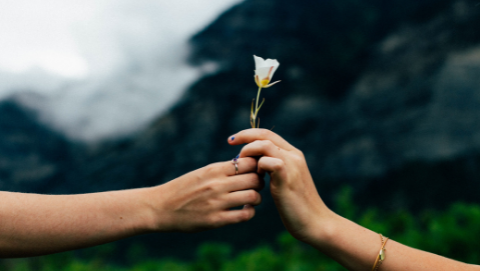The Benefits of Kindness on Mental Well-being
By Lisa Schainker, Extension Assistant Professor
To illustrate the power of kindness, I would like to share a personal story about how I experienced it firsthand.
One day I was shopping at my local grocery store. As I made it up to the front of the check-out line, I realized that I had left my wallet at home. I let the cashier know that I would have to leave my items behind because I had no way to pay for them. A gentleman who had just finished paying for his groceries had overheard me explaining my situation to the cashier. He said, “It would make my day to pay for your groceries.” I stood there feeling both shocked and humbled by his kind offer. I really didn’t know what to do. It was a busy time in the store and there were many people watching our exchange. Although it felt very awkward to accept such a generous gift from a stranger, what he told me next made me feel at ease with his offer to help. He said, “I know you will pay it forward when you have the chance” and I agreed that I would as I reluctantly let him pay the cashier for my items. His kindness in that moment has stuck with me ever since.
There is research supporting my benefactor’s claim that being kind to me would make his day. In fact, studies have found that when we are kind to another person, the pleasure center in our brain is activated (Breden, 2019). The “helper’s high,” as it is often referred to, is a result of higher levels of dopamine, serotonin, and oxytocin (Cedars-Sinai Staff, 2019). These are brain chemicals that positively impact our mood. Additional research has found that doing kind things for others can increase our confidence, happiness, and optimism (Kerr et al., 2015), and reduce levels of anxiety, stress, and depression (Breden, 2019). Those on the receiving end of kindness have reported smiling more and engaging in kind acts for others, or “paying it forward” (Pressman et al., 2015).
There are many ways to express kindness to others and reap the benefits to your mental well-being. For example, volunteering in your community is a great way to be kind by helping others. Research has shown that in addition to benefitting the people or organizations you are providing service to, it can benefit you by increasing feelings of self-esteem, social connection, and well-being (Brown et al., 2012). Volunteering even one time a month can increase happiness and elevate your mood (Lawton et al., 2021).
Here are some other ideas for ways to be kind to others:
- Give to a charity or give an extra big tip to drivers, food servers, and other service workers
- Tell someone’s supervisor that they did a great job
- Support local businesses as a way to give back to your community
- Write notes to your co-workers to let them know what you appreciate about them
- Find small ways to help your friends or neighbors
- Share your expertise or talents with others
- Pick up trash when you see it and try to leave places better than you found them
- Donate extra produce from your garden to food pantries or neighbors in need
Find more ideas for acts of kindness here: https://www.randomactsofkindness.org/kindness-ideas
References:
Breden, L. (2019, March 6). The power of kindness. https://www.behavioralessentials.com/the-power-of-kindness/
Brown, K. M., Hoye, R., & Nicholson, M. (2012). Self-esteem, self-efficacy, and social connectedness as mediators of the relationship between volunteering and well-being, Journal of Social Service Research, 38(4), 468–483. https://doi.org/10.1080/01488376.2012.687706
Cedars-Sinai Staff. (2019, February 13). The science of kindness. https://www.cedars-sinai.org/blog/science-of-kindness.html
Kerr, S. L., O’Donovan, A., & Pepping, C. A. (2015). Can gratitude and kindness interventions enhance well-being in a clinical sample? Journal of Happiness Studies, 16, 17–36. https://doi.org/10.1007/s10902-013-9492-1
Lawton, R. N., Gramatki, I., Watt, W. et al. (2021). Does volunteering make us happier, or are happier people more likely to volunteer? Addressing the problem of reverse causality when estimating the wellbeing impacts of volunteering. Journal of Happiness Studies, 22, 599–624. https://doi.org/10.1007/s10902-020-00242-8
Pressman, S. D., Kraft, T. L., & Cross, M. P. (2015). It’s good to do good and receive good: The impact of a ‘pay it forward’ style kindness intervention on giver and receiver well-being, The Journal of Positive Psychology, 10(4), 293–302. https://doi.org/10.1080/17439760.2014.965269


 Utah 4-H & Youth
Utah 4-H & Youth